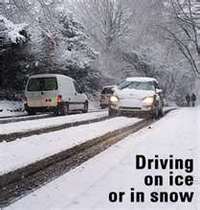Motorists Offered Advice for Safer Winter Driving
 |
LONDON--November 15, 2011:
Last year's icy conditions and the early forecasts of snow for this winter, mean many motorists are already preparing their vehicles for the months ahead, but it's not just the car that needs to be prepared, drivers themselves can do more to aid safety says car hire [http://www.erentals.co.uk ] specialist eRentals UK.
To help, eRentals.co.uk has put together its top tips for safer winter driving, combining car preparation with some simple actions that can help build confidence.
1) Don't Rush - Make sure you leave in plenty of time so
you're not rushing, and ensure you clear all windows - not just a small
section - before setting off.
2) Clear Vision - Ensure screen wash is topped up and check your
wiper blades, damaged blades will have more difficulty clearing dirt
from the screen. Finally, check your lights are in working order.
3) Take it Steady - Stopping distances can be 10 times longer in
ice and snow, so slow down and ensure you leave enough space between you
and the vehicle in front.
4) Check the Tyres - Make sure tyres have the correct tread and
consider changing to winter tyres as they give better grip. A minimum
tread depth of at least 3mm is advised for winter driving.
5) Plan Your Route - It may sound simple, but by taking the time
to plan the best route, drivers can avoid getting lost and keep to
gritted main roads.
6) Put on the Brakes - Good brakes are essential in winter, so the
pads, discs and brake fluid need to be checked.
7) Check the weather conditions - Before you set off on any
journey, but particularly a long journey, check the weather forecast and
the conditions for your route. If it's bad stay at home - it's not worth
the risk.
8) Navigation - Programme the Sat Nav before setting off to limit
any distractions while behind the wheel.
9) Emergency Essentials - Make sure you put together an emergency
kit and leave it in the car including warm clothing, food, spade, torch,
and first aid kit.
10) Phone a friend - Always tell someone at your destination the
route you're taking and what time you expect to get there.


